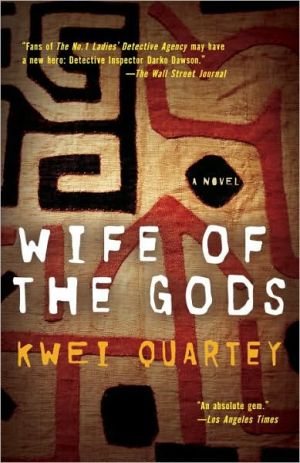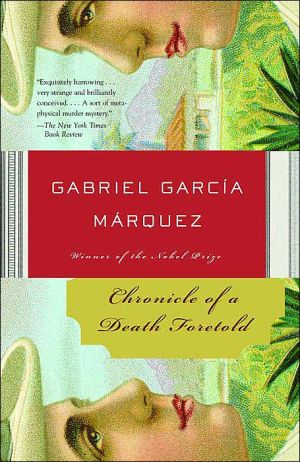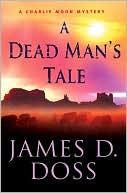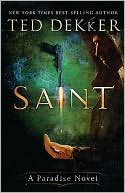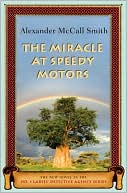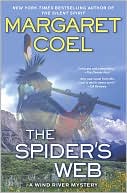Wife of the Gods
"In a shady grove outside the small town of Ketanu, a young woman - a promising med student - has been found dead under suspicious circumstances. Eager to close the case, the local police have arrested a poor, enamored teenage boy and charged him with murder. Needless to say, they are less than thrilled when an outside force arrives from the big city to lead an inquiry into the baffling case." "Detective Inspector Darko Dawson, fluent in Ketanu's indigenous language, is the right man for the...
Search in google:
A lyrical and captivating mystery that brings to life the majesty and charm of Ghana---from the capital city of Accra to a small community where long-buried secrets are about to rise to the surface.Publishers WeeklyQuartey's winning debut, a police procedural set in modern Ghana, introduces gifted detective Darko Dawson. Dawson leaves the capital city of Accra to investigate a murder in remote Ketanu, where traditional beliefs about the spirit world still reign. He finds no lack of suspects, as the beautiful victim was a married man's impatient mistress and a controversial crusader against AIDS and trokosi, the ancient custom in which young girls become slave wives to local priests. Ketanu is also the village from which Dawson's mother disappeared years before, and his visits awaken a buried need to solve that mystery as well. Dawson is a wonderful creation, a man as rich with contradictions as the Ghana Quartey so delightfully evokes-a loving husband and father with anger management issues on the job and a personal fondness for marijuana. Despite a not hugely exciting denouement, readers will be eager for the next installment in what one hopes will be a long series. (July)Copyright © Reed Business Information, a division of Reed Elsevier Inc. All rights reserved.
Wife of the Gods\ A Novel \ \ By Kwei Quartey \ Random House\ Copyright © 2009 Kwei Quartey\ All right reserved.\ ISBN: 9781400067596 \ \ \ Chapter One\ \ \ INSPECTOR MAX FITI had great significance in a place that had little. He was the head of police in Ketanu, a small town in the Adaklu-Anyigbe District of Ghana's Volta Region. All he had was a small police station as ragged as a stray dog, two constables, and an old police vehicle that ran erratically, but when there was trouble, people turned to Fiti. \ \ Case in point: Charles Mensah, a fortyish man with a painfully thin body and a bulbous head like a soldier termite, had just come into his office this morning to report his sister missing. \ \ "When did you last see Gladys?" Fiti asked.\ \ "Yesterday afternoon, around three," Charles said. "Just before she left for Bedome." \ \ "She went to Bedome? To do what?" \ \ "You know she's a volunteer with the Ghana Health Service AIDS outreach. She goes to different villages to teach and so on." "Aha, yes." \ \ The village of Bedome was east of Ketanu on the other side of the forest. \ \ "When she didn't come back home yesterday evening," Charles continued, "I thought it was strange, so I rang her mobile and left a message. She never called back and I started to get worried, sothen I rang Timothy Sowah, the director of the AIDS program, and he said he too had been unable to reach her on the mobile." \ \ "Maybe she went to another village where the reception is poor?" Fiti suggested. \ \ "Mr. Sowah told me Bedome was the only place she was scheduled to visit," Charles replied. \ \ "Are you sure she actually got to Bedome? I mean, not that I'm saying something bad happened on the way, but-" \ \ "I understand what you mean, Inspector. I got up early this morning-I couldn't sleep anyway-and I went to Bedome to check. Everyone told me yes, that Gladys had been there yesterday and she had left some time before sunset to go back to Ketanu." True, less than twenty-four hours had passed, Fiti reflected, but he agreed this was all very troubling. Gladys Mensah was a serious girl- reliable, solid, and smart. And beautiful. Very, very lovely indeed. So, yes, Fiti took this seriously. He jotted some notes on a legal pad, sitting slightly sideways because his rotund belly prevented him from pulling up close to his desk. Fiti was approaching the half-century mark in age, and most of the weight he had recently been gaining had gone to his midsection. \ \ "Something else I want to tell you," Charles said. "Maybe it's nothing, but while I was on my way to Bedome this morning, I spoke to some farmers who have their plots near the forest. They told me that while they were working yesterday evening, they saw Samuel Boateng talking to Gladys as she was on her way back to Ketanu." \ \ Inspector Fiti's eyes narrowed. "Is that so?" \ \ He didn't like the Boateng family much. Samuel, the second oldest boy, was a ruffian who had once stolen a packet of PK chewing gum from a market stall. \ \ "Have you asked Samuel or his father about it?" Fiti said. \ \ "We don't speak to the Boatengs," Charles said tersely. \ \ Fiti pressed his lips together. "Don't worry, I'll go and see them myself." \ \ Chapter Two\ \ \ EFIA WAS A TROKOSI, which meant that she belonged to the gods. Eighteen years ago, her uncle Kudzo beat a man to death with a branch from a baobab tree. Over the next several months, bad things began to happen to the family: crops failed because of drought, Efia's mother had a stroke, and a cousin drowned in a river. Everyone in the family panicked. Even though Uncle Kudzo had been imprisoned for his crime, it appeared the gods were punishing the family for what he had done. This was the only reasonable explanation for the horrible series of events that had been taking place, and who knew how many more catastrophes were to be meted out by the gods? \ \ The family elders went to the Bedome shrine to consult with Togbe Adzima, chief and High Priest of the village. Adzima, who was an intermediary between the physical world and the spirit world, said yes, there was most certainly a way out of this predicament. The family needed to bring a female child to serve at the shrine. Efia, twelve at the time, was the perfect choice. She was handed over to Adzima to learn "moral ways." This would restore good fortune to the family. As a trokosi, though, she officially belonged to the gods and was to bear their children through Togbe Adzima. He had three other trokosi and nineteen children among them. The wives cooked for him, cleaned, made palm wine, and harvested crops. Every penny from the sale of foodstuffs went to him. And there lay the heart of the matter. Whatever the supposed reason for the women serving at the shrine, despite their being sometimes loftily called "wives of the gods," they were the source of all Togbe's plenty, and that made life very good for him. Whenever Efia looked back on the day her new life as a trokosi began, she flinched with the pain of the memory. She and the extended family had walked about sixteen kilometers from their home village to the shrine, bearing all kinds of gifts for Togbe. Efia didn't understand why she was being cleaved from her family. She cried and cried and could not stop. \ \ The shrine itself was a low mud hut containing a large, brightly painted wood carving plastered with human and animal figures. The gods endowed this carved object with magical powers that the priest could summon whenever needed. That's why it was often called a "fetish object" and the priest a "fetish priest," even though many of the priests didn't like the word fetish used to describe them. \ \ Efia remembered entering another hut close to the shrine while her family stayed outside. It was hotter than a northern desert in there, smelly and stifling. Efia knelt down in front of Togbe and two other priests. They poured libation with schnapps and drank up whatever was left in the bottle. Togbe, sweat dripping off his face and body, chanted magic words and waved an oxtail fly whisk over different shrine objects. \ \ \ Every stitch of Efia's clothing was removed, and a female elder inspected her to make sure she was a virgin. As Efia bowed down in obeisance to the fetish objects, she felt as if she would be choked to death by the smoky heat and the alcohol breath of the men. \ \ But she didn't die. She survived. Her family left her in Bedome and she began her life at the shrine. She never tried to run away. The gods would punish her for that, and anyway, where would she go? Once Efia had reached puberty, Togbe Adzima began to have sex with her. At the age of sixteen, she had her first child, Ama, who was now fourteen. \ \ Efia had missed her period last month and she could tell she was pregnant again. She had suffered two miscarriages since Ama was born. Her second live child, a boy, had died of malaria before he reached the age of one. \ \ Togbe Adzima would want to eat plantain fufu for lunch. Balancing an empty basket on her head without the aid of her hands, Efia walked through the thick bush of the forest toward the plantain grove. Her feet, broad and solid from years of walking, easily passed over the tricky terrain of low shrubs, dead leaves, fallen trees, and trailing vines. It had rained a little last night, and the moist earth was fragrant. Overhead in the trees, birds filled the crisp air with bright morning song. \ \ \ As she came level with a palm tree, she caught a glimpse of an animal on the ground barely a second before she stepped on it. Snake. She jumped to the side with natural quickness. But when she looked now, she saw that it wasn't a snake. It was a human foot, toes pointing up. \ \ Efia put down her basket and moved slowly around the palm tree. She saw a woman lying on her back partially obscured by the branches of a low shrub. She was fully clothed. Her legs were together, her arms by her sides. Sleeping? \ \ "Heh!" Efia called out. "Hello?" \ \ She came forward two steps, pulled the branches aside, and when she saw the face, the wide-open eyes and the gaping mouth, she recoiled and her blood went cold. \ \ No. "Gladys?" In a way, Gladys seemed different, in another way she looked the same. Efia touched her and was shocked by how cold and rigid she was. Her eyes were open but unmoving and cloudy white, as though filled with coconut milk. \ \ \ "Gladys." Efia began to cry. "Ao, Gladys, wake up, wake up. Gladys!" \ \ She got to her feet and whirled in a circle shrieking for help, but no one was close by. She began to run. Her vision darkened, her hearing deadened, and her feet lost sensation. \ \ She burst out of the bush and spotted a man walking ahead along the Bedome-Ketanu footpath, and she ran after him screaming. He stopped and turned around, and as Efia got closer she recognized him as Isaac Kutu, the local herbalist and healer. His compound was not far away. She felt a surge of hope. Healer. Maybe he can do something. \ \ "Mr. Kutu." She was gasping, trying to catch her breath. "Mr. Kutu, please come." \ \ "What's wrong?" \ \ "It's Gladys Mensah. Hurry!" \ \ Efia turned and began to run back. She could hear Mr. Kutu keeping up behind her. The bush seemed thicker and more tangled now that her energy was so spent, but she knew the way well and got there quickly. \ \ The body was still there. Efia stopped, pointed, and then leaned over with her hands on her knees to get her breath. \ \ Mr. Kutu pulled aside the obscuring bush and drew back at the sight. He stared for a moment and then knelt down by the body. He touched it softly and whispered something Efia didn't catch. He looked stunned. \ \ Kutu stood up. "Bring me something to cover her." \ \ Several plantain trees, their leaves long and broad, were only a few feet away. Efia pulled on a branch and broke it off. Kutu laid it gently across Gladys's body. It seemed much better that way, so much more dignified. \ \ "I have to go and get Inspector Fiti," Kutu said. "Can you wait here for us to come back?" \ \ Efia backed away, shaking her head. "No. I'm afraid to stay with her by myself." \ \ She turned and bolted back to Bedome without stopping or looking back. \ \ Including the shrine, Bedome was a collection of a dozen scattered thatch-roofed huts. Yesterday's rain had stained the soil dark, but once it dried out, it would be the identical monotonous light brown color of the dwellings. \ \ The normal morning's activities-sweeping, cooking, collecting water, the smaller children playing-had begun, but everything stopped as Efia came running. She collapsed to the ground wheezing with exhaustion, her face buried in her palms. The trokosi wives came to her at once, dropping down beside her. What's wrong, what's the matter? \ \ Efia couldn't speak. She was paralyzed with shock. Nunana, the oldest, most experienced wife, her body worn and wiry and her breasts wrung dry by the toll of six children, pulled Efia up and led her protectively away. \ \ "What happened?" she said softly. And suddenly more sharply, "Stop crying and tell me what's wrong." \ \ As Efia was sobbing out her answer, Togbe Adzima came out of his hut shirtless and yelled, "What are you people doing standing around like cocoa trees?" \ \ He was in his late fifties. He was oily and never looked clean, and his eyes were red and muddy from drinking. \ \ "Nunana!" \ \ She came to him quickly. \ \ "What's going on?" he demanded. \ \ "Please, Togbe. Efia says Gladys Mensah is dead in the forest." \ \ "What?" "She found her at the plantain grove." \ \ "When?" \ \ "Just now, Togbe." \ \ He looked baffled. He beckoned Efia over, and the children of the shrine fell in behind her, eyes wide with curiosity. \ \ "What are you saying, Efia?" \ \ She repeated what she had told Nunana. Togbe Adzima frowned. "Are you sure?" \ \ Efia nodded. She tried to wipe her tears away, but they kept pouring. \ \ Adzima went into his hut and came back out buttoning his shirt. "I'm going to see for myself. Finish your work. Make sure my akasa is ready when I return." \ \ The Boatengs' home was a ramshackle house on its last legs. When Inspector Fiti entered, Mr. Boateng looked wary and his wife was visibly nervous. She offered Fiti some water, which he dismissed as if she had suggested poison. Four of the seven children were at home, all of them in tattered clothing. \ \ "Where is Samuel?" Fiti asked in Ewe. \ \ "Please, Inspector, he went with some friends to somewhere," Boateng said. \ \ "Find him," Fiti said. "I want to talk to him. Right now." \ \ Boateng's eight-year-old son went to look for Samuel and came back with him a few minutes later. Samuel was nineteen, compact and wiry, the striations of his ropy muscles showing through his faded shirt. Chale-wate sandals clung to his muddy feet by threads. He looked suspiciously from the inspector to his parents. \ \ "Sit on the floor," Fiti told him. \ \ Samuel's face was fluid and mobile. His forehead creased and relaxed in rapid waves like a physical manifestation of his mind at work. He sat down looking both wary and defiant. The inspector moved closer and stood over him. \ \ "Have you seen Gladys Mensah today?" Samuel's brow furrowed. "Please, no, sir." \ \ "What about yesterday? Did you see her?" \ \ "Yesterday? No, sir." \ \ "Don't lie, boy. Some farmers saw you with her." \ \ "No, sir. It wasn't me." \ \ "Hello, Inspector?" \ \ Everyone turned in the direction of the voice. Isaac Kutu was standing at the door. \ \ "Yes?" Fiti saw the grave look on Isaac's face. "What's the matter?" \ \ "You should come, Inspector. Gladys Mensah is dead." \ \ Chapter Three\ \ \ \ BAD NEWS SPREADS THROUGH any small town like fire through dry savanna bush. Kweku and Osewa Gedze first heard about Gladys Mensah's death as they were working on their cocoa farm. The golden ripe cocoa pods were particularly beautiful this year. Each was perfectly almond shaped with sculptured ridges that ended in a point like an erect nipple. One pod held thirty to forty fleshy seeds that were scooped out, fermented, and then dried for days before they were ready to be shoveled into sacks for shipping. It was back-splitting work, and for all of it Osewa and Kweku would probably never savor a single mini-square of the final product-chocolate. It all went to fancy stores in the big cities at prices that they could never dream of paying. \ \ Kweku wiped the sweat off his face and watched his wife for a moment. She was on her knees deftly slashing the pods open with a cutlass. Fifty-one years old and nine years his junior, she was strong and skilled with powerful hands that wielded a cutlass or shovel better than most men. \ \ Continues... \ \ \ \ Excerpted from Wife of the Gods by Kwei Quartey Copyright © 2009 by Kwei Quartey. Excerpted by permission.\ All rights reserved. No part of this excerpt may be reproduced or reprinted without permission in writing from the publisher.\ Excerpts are provided by Dial-A-Book Inc. solely for the personal use of visitors to this web site. \ \
\ Publishers WeeklyQuartey's winning debut, a police procedural set in modern Ghana, introduces gifted detective Darko Dawson. Dawson leaves the capital city of Accra to investigate a murder in remote Ketanu, where traditional beliefs about the spirit world still reign. He finds no lack of suspects, as the beautiful victim was a married man's impatient mistress and a controversial crusader against AIDS and trokosi, the ancient custom in which young girls become slave wives to local priests. Ketanu is also the village from which Dawson's mother disappeared years before, and his visits awaken a buried need to solve that mystery as well. Dawson is a wonderful creation, a man as rich with contradictions as the Ghana Quartey so delightfully evokes-a loving husband and father with anger management issues on the job and a personal fondness for marijuana. Despite a not hugely exciting denouement, readers will be eager for the next installment in what one hopes will be a long series. (July)\ Copyright © Reed Business Information, a division of Reed Elsevier Inc. All rights reserved.\ \ \ \ \ Library JournalA medical resident working with Ghana's Ministry of Health's AIDS program is murdered, and Detective Inspector Darko Dawson has been asked to investigate. Not only is he an excellent detective but he has family ties to the village. Alas, nothing about this case is simple, and the growing rift between Dawson's modern police work and a local inspector's refusal to move past traditionally accepted beliefs jeopardizes a successful arrest. The uncommon grace and style of the writing will engender comparisons with Alexander McCall Smith's Botswana stories, but this novel has more grit. Darko is a sleuth full of contradictions, a tough defender of justice and truth who is also a habitual pot smoker. Yet it's the crossover between Dark's professional life and personal issues that helps drive the plot and makes his story more relatable. This well-crafted first novel is a smart purchase for all libraries and a great choice for a book club discussion. [Library marketing; for an African mystery readalike, see also Michael Stanley's The Second Death of Goodluck Tinubu.-Ed.]\ —Stacey Hayman\ \ \ \ Kirkus ReviewsMove over Alexander McCall Smith. Ghana has joined Botswana on the map of mystery. All too shortly after her brother Charles reports her missing to Ketanu's Inspector Max Fiti, the body of Gladys Mensah, medical student and AIDS-outreach volunteer, is found in the forest by Efia, the fourth wife of Togbe Adzima, chief and High Priest of Bedome. Testimony indicates that Gladys was returning from Bedome to Ketanu but never completed her journey, perhaps because she was detained by Samuel Boateng, the 19-year-old who had a crush on her. Inspector Fiti, uneasily aware that he's out past his depth, asks for help from the police force in nearby Ho, but instead Timothy Sowah, the director of the AIDS program, convinces higher-ups to send Detective Inspector Darko Dawson from the capital city of Accra to Ketanu, the town from which his mother disappeared after a visit to her infant nephew 23 years ago. Despite Dawson's interest in Ketanu, the small-town cop and the big-city cop don't exactly bond, and soon Dawson crosses swords with Fiti over the local officer's methodical beatings of Samuel Boateng, whom he's convinced murdered Gladys. Ironically, Dawson's hands are no cleaner than Fiti's. His explosive temper has already led him to attack both Togbe Adzima and a witch doctor whose unauthorized treatment nearly killed Dawson's son. Quartey's approach to detective work is less charming and more sociological than McCall Smith's, his setting more rural and susceptible to the ways of magicians. There's plenty of room for them both, and the newcomer is most welcome. Agent: Marly Rusoff/Marly Rusoff & Associates\ \ \ \ \ Publishers WeeklyThe murder of a young med student brings Det. Insp. Darko Dawson from his police department in Ghana's capital, Accra, to the smalltown of Ketanu, where some dark secrets of his own lie buried. In returning to this familiar landscape, Dawson looks to solve this murder as well as unlock the secrets surrounding the disappearance of his mother so many years ago. Quartey delivers an intriguing and enjoyable mystery set against the backdrop of a Ghana in turmoil over its changing cultural values, from its traditional roots into a disconnected, modernized world. With a crisp English accent and deep but deliberate projection, Simon Prebble is a boon to any production. He creates clear and distinct voices that make it easy to follow the different speaking roles, regardless of the African names that listeners may not be familiar with. His narration is consistent and compelling in his rhythm and emphasis, and blends beautifully with Quartey's style. A Random hardcover. (Feb.)\ \ \ \ \ From the Publisher"With a crisp English accent and deep but deliberate projection, Simon Prebble is a boon to any production.... And blends beautifully with Quartey's style." —-Publishers Weekly Audio Review\ \ \ \ \ Library JournalGhana-born Quartey's debut novel is a mature, richly plotted mystery with a fully rounded protagonist who compares favorably with the best in modern detective fiction. When Detective Inspector Darko Dawson of Ghana's Criminal Investigation Division goes upcountry to investigate a murder, he confronts a powerful traditional belief system, a brutal local police chief, and a troubling mystery in his own family. Eleven-time Audie Award nominee Simon Prebble's consistently strong narration is a joy to hear. Highly recommended. [The Random hc also received a starred review, LJ 5/15/09; Quartey's second Darko Dawson title, Children of the Street, is scheduled to be published in 2011.—Ed.]—R. Kent Rasmussen, Thousand Oaks, CA\ \
